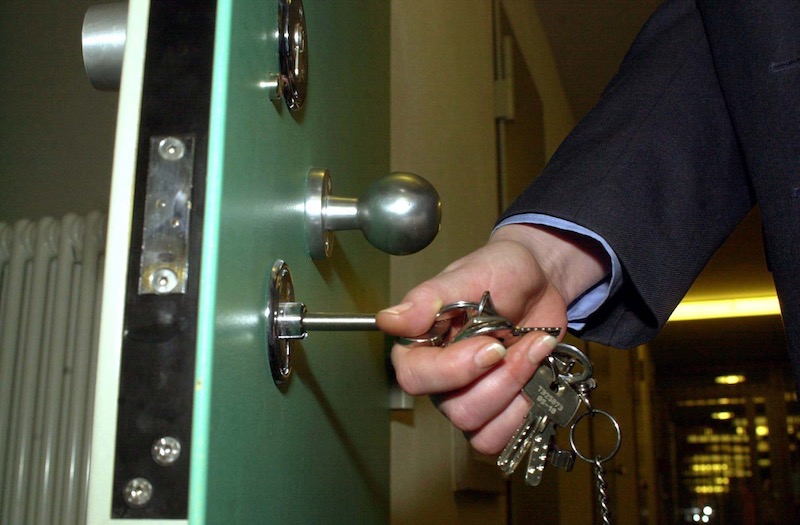Read a blog by Andy Keen-Downs of Pact on what it is like behind bars during lockdown.
Since 23 March, around 80,000 people have been in prison cells, only being released briefly each day for a shower and a phone call home. Many have been in single cells, and so in effect, have been in almost complete isolation. “Lockdown is a word that has come from the world of prisons, but what prisoners have experienced has been very different from how it has been for most of us,” said Andy Keen-Downs, director of the Catholic charity which works with and for people affected by imprisonment – The Prison Advice and Care Trust (Pact). “In prison lingo, lockdown means being ‘behind your door’, that is, in your cell for at least 23 hours of everyday,” he told The Tablet, and “the normal ‘regime’ of prison has stopped.”
However, Pact has been working, alongside chaplains, “bringing the care and support of the Church to people in prison, their children and families.” Mr Keen-Downs reported that, “some prisoners have coped well with lockdown, but others are struggling with the isolation and the effect on their health and mental health.” This week Phil Copple, director general of prisons, said: “The situation in our prisons has been much better than we dared to hope, but as a system we have experienced real tragedies – the Covid-19 related deaths of 10 staff and 24 prisoners.”
At the start of lockdown Pact lobbied the government to help prisoners to maintain connections with their families, and access to cell phones has increased plus some secure video calls.
Pact also continued to provide one-to-one support to prisoners and their families. Its Helpline for prisoners’ families saw calls double, with thousands of frantically worried family members desperate for information,” Mr Keen-Downs told The Tablet.
Pact sent in tens of thousands of packs for prisoners, including activities to stave off boredom, a ‘Writing Home’ pack, and other resources. For mothers leaving prison, Pact provided grants to purchase food, nappies, and essentials, and provided emergency grants to struggling families and prison leavers, “who still only receive a £46 end of custody grant whilst they wait for Universal Credit payments, forcing many to choose between re-offending or sleeping on the streets.”
Pact Resettlement teams also continued to provide mentoring and advocacy support, and the Government’s support for emergency accommodation has been essential in helping prison leavers avoid seeping rough during the pandemic. The current focus of Pact is on working with the Prison Service on plans to restore visits for families.
Emma Wells, national secretary of the Community Chaplaincy Association, told The Tablet: “Most projects are managing to deliver a service albeit reduced and remotely.” Her major policy concern is that, “the success of segregation and isolation to control the virus spread will lead to significant lock up becoming the new normal and that the disproportionality will continue to be overlooked.” She pointed out that over 50 per cent of prisoners under 23 are from Bame backgrounds.
Joy Doal of the Anawim, a women's centre in Birmingham – originally set up to support women in prostitution under two charities, Our Lady of Charity and Father Hudson's Society – reported that although going into prison has stopped, “all our caseworkers are still supporting their women over the phone and some groups are operating over zoom.”
Anawim engages with two main prisons which accommodate women from the Birmingham area. As lockdown started, packs were sent to women for use in their cells containing well-being activities and advice. Anawim’s drop-in centre has remained open from which food, clothes and toiletries are distributed.
“We have delivered around 150 parcels to homes, set up a helpline with free phone number and a chat function on our website,” Ms Doal told The Tablet. Two caseworkers, a manager and a drop in worker and administration support are in the centre every day and all women are phoned at least weekly.
“We will be slowly opening the centre back up for group work as it gets safer,” she said, and “we have builders in at the moment opening up our entrance so it is wider to allow social distancing.” Anawim still supports women at family court. “We are still receiving referrals from police for our New Chance diversion project, offering an alternative to women being charged,” she reported, “and we run an alternative to custody with women referred by National Probation Service.”
London-based Fr Gerry McFlynn, of the Irish Chaplaincy in Britain, normally visits prisons around England and Wales. Irish prisoners constitute the third largest ethnic group within the prison system, after Polish and Romanian prisoners.
He told The Tablet that his work “has been severely affected by the pandemic; in particular, prison visiting, which is the very backbone of our outreach service, has been suspended until further notice.”
He described the plight of prisoners as “truly terrible.” For the one hour out of their cells, “they have had to choose between queuing up for a family phone call (which may not materialise) or having a shower!” He said younger prisoners are finding it most difficult to cope with these restrictions, especially prisoners from the Traveller community who make up more than 45 percent of the Irish prisoner population. “These prisoners are used to living their lives out in the open and cannot cope with being confined for long periods of time,” he reported, and “this confinement is having an adverse effect on their mental health, especially now that family visits have also been discontinued.”
Over the past three months the Irish Chaplaincy has engaged with prisoners by emailing them. Fr McFlynn said, “we have also provided them with money for much-needed phone credit so that they can keep in touch with loved ones in the absence of visits – this has been by far the most pressing need of prisoners during lockdown.” He felt many are now just desperate to talk to someone, reflecting that, “a recent example was when I received a call from a prisoner in the segregation unit of a prison threatening self-harm and desperate to talk to someone outside the prison about his situation.”
Prisoners have been sent games, puzzles, colouring books, and CDs of Irish music. A traveller at HMP Stocken wrote: “I’m really thankful and even more now I have some stuff to do to kill the time.” Fr McFlynn said: “This service is likely to continue for many months to come as the indications are that family visiting may now not re-commence until late October at the earliest.”
The Catholic Bishops Conference of England and Wales told The Tablet that 338 chaplains serve more 14,000 Catholic prisoners and, “throughout the lockdown Catholic chaplains have been on hand to provide spiritual and pastoral support.”
They are clergy, religious and lay. Corporate worship has been suspended, but “there has been a significantly increased take-up of chaplaincy services among Catholics in prison during the lockdown with more people asking for support and resources than would normally attend Mass.” Those receiving chaplaincy services have responded very positively, “highlighting how it has helped them to cope with this difficult period and address anxieties they are facing and this has been especially important while people have not been able to see their families.”
Pact’s website is here. Prisoners Families Helpline 0808 808 2003 (Open 7 days a week. Free confidential service).



 Loading ...
Loading ...